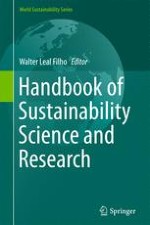2018 | OriginalPaper | Buchkapitel
A Systematic Approach to Adopt Sustainability and Efficiency Practices in Energy-Intensive Industries
verfasst von : Karin Tschiggerl, Milan Topić
Erschienen in: Handbook of Sustainability Science and Research
Aktivieren Sie unsere intelligente Suche, um passende Fachinhalte oder Patente zu finden.
Wählen Sie Textabschnitte aus um mit Künstlicher Intelligenz passenden Patente zu finden. powered by
Markieren Sie Textabschnitte, um KI-gestützt weitere passende Inhalte zu finden. powered by
